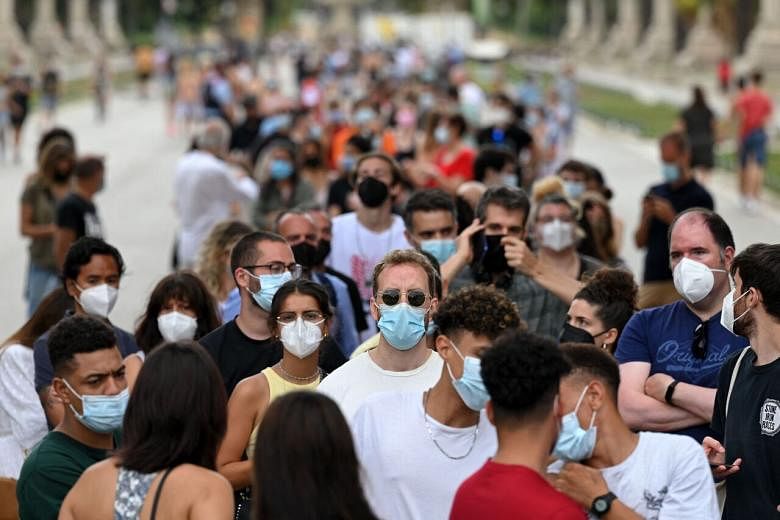MADRID (NYTIMES) - A month ago, Spain was riding high on its successes against Covid-19. The country's caseload was among the lowest in Europe, and nearly 80 per cent of the country had been vaccinated, leaving few eligible people to give a shot to.
Then came the Omicron variant, and success gave way to uncertainty.
Three cases of the variant have been detected so far in Spain as the number of Covid infections steadily rose all November.
The appearance of the variant has now prompted local governments to swiftly roll out new measures they had been considering.
Catalonia is introducing a Covid "passport," the first in Spain. The Basque region is preparing emergency measures with restrictions on bars and restaurants that look like a return to the past.
The new steps show how fragile the gains against the virus can be. But the country's broad acceptance of vaccination may prove to be critical.
If the current vaccines offer good protection against the variant, then Spain could be largely shielded against a potential new wave. If fighting Omicron requires reformulating the vaccines, then Spaniards seem ready and willing to take another shot if their leaders recommend it.
"As far as vaccines go, in Spain there's just a wide consensus among citizens; they follow the recommendations of the scientists," said Mr Salvador Illa, Spain's former health minister who oversaw the country's response during the pandemic's first year.
Experts attribute Spain's vaccine success, in part, to its widely trusted public health system, which spearheaded the effort.
Politicians also played a big role, taking their doses with fanfare early on and avoiding politicised debate about the vaccine. Spaniards, for the most part, followed the health guidance of their leaders when it came to vaccines, masks and other precautions.
Delays in the European Union's vaccine rollout initially left Spain well behind the United States and Britain. But as supply issues were resolved, the country rapidly caught up.
Now almost 90 per cent of those eligible for the shot - anyone older than 12 - have gotten it, with few Spaniards left to vaccinate.
Walk the streets of Spain, and one encounters a different Europe from the norm on much of the continent. Masks are not only worn indoors but are also worn outdoors by residents in many cities where the government has not required them for months.
And although fights over the pandemic response have been common in Spain's charged political landscape, almost none have concerned whether citizens should be vaccinated.
Among the chief reasons for that consensus on vaccines, many said, was that Spain was hit hard by the pandemic early on. About 15,500 people perished from Covid in April 2020 alone, putting Spain's first wave in line with those in Italy and in New York City.
Spaniards, like residents of those places, were inundated with headlines of hospitals overwhelmed by intubated patients and makeshift morgues that received the bodies.
Mr Rafael Vilasanjuan, policy director at ISGlobal, a Barcelona public health think tank, said the experience left a deep collective will for vaccination.
"In the first wave, we were completely unprotected," he said. "There was nothing. This was a big deal in Spain."

Countries such as Germany and Austria, where vaccine resistance has now become entrenched in some corners, also faced deadly waves of infections. But they came later in the pandemic. In Germany, 69 per cent of its 83 million people are fully vaccinated, while in Austria, a country of about 9 million, 67 per cent are fully vaccinated.
Mr Vilasanjuan said Spain's demographics also worked favourably toward vaccine acceptance. The country has many at-risk older adults - nearly 20 per cent of the population - and Spanish youths live with their parents until they are 30, on average.
This led to many multigenerational households where young adults got vaccinations to protect older relatives.
"There's been an intergenerational respect that has meant more people vaccinated," Mr Vilasanjuan said.

Another factor that may have set Spain apart from other countries was that its politicians largely avoided turning the scientific consensus on vaccines into an arena of debate.
Ms Maria Luisa Hernandez, a pharmacist in the nearby village of Hoyos del Espino, said she believed that Spain's first wave of infections jolted the population into readily accepting vaccines when they were available.
She estimated that about 60 per cent of the area's population was elderly. During the first weeks of the pandemic, lockdowns closed public health clinics, and people were able to reach their doctors only by phone. Many older residents were unable to navigate the complex system of online prescriptions.
Ms Hernandez, whose pharmacy remained open during the lockdown, ended up becoming the only health professional seeing the sick in person. She and everyone she knows are vaccinated. No one wanted to return to the situation in 2020, she said.

Still, Spain remains on guard, both because of the Omicron variant and the new wave of Covid cases that began before the variant's discovery. New infections have more than tripled in recent weeks, to about 190 cases per 100,000 people in the last 14-day period.
The numbers, however, are far lower than in other European countries, including Germany, the Czech Republic and the Netherlands, which are now among the worst hit for infections.
Ms Francisca Hernandez sees this as no reason to let down her guard.
The 77-year-old, who is not related to the pharmacist, lives in a multigenerational household. Her daughter moved in with her after losing her job. Her son, a cattle rancher, is constantly meeting up with other men as they move their livestock to pastures, then coming to see her.
She said she got her third shot last week. Everyone in her family will soon have theirs once her youngest grandchildren qualify.
"In my circle, there is no one who isn't vaccinated," she said. "We know this is the only solution."

